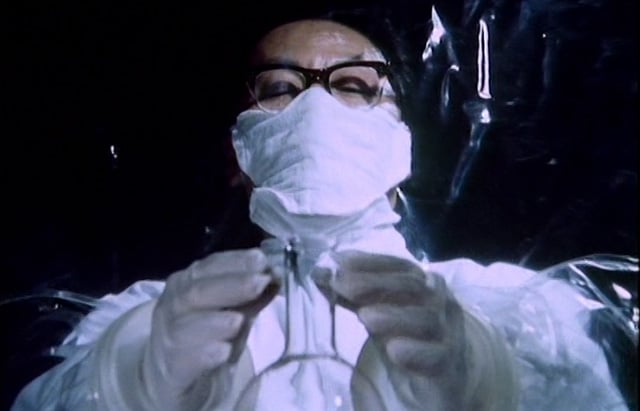In 1975, BBC Television produced a drama series that imagined what life would be like in the wake of a pandemic — where only 1 out of every 5,000 persons survived.
Over the next few years, Survivors became appointment television for a generation of viewers. Its colourful and often ambiguous characters explored the struggles of rebuilding society, using a post-apocalyptic landscape as a lens to study political anxieties of the moment.
35 years on, and the world is experiencing a very similar predicament. Join Greg Jameson and Samuel Payne as they revisit the first six episodes of the series and rediscover, with some uncanny accuracy, how close Survivors came to predicting the real-world challenges of today.
Sam: So, Greg. Why are you revisiting Survivors now? I mean, you’ve seen it. We both have.
Greg: I haven’t watched it all the way through for about ten years. But the series has had a profound effect on me. The opening episode deals with the outbreak of a pandemic that ultimately wipes out 99% of the human race.
When stories of a new virus came out of China in December, I thought: “Is this it?” We’ve had them before; so many biblical stories deal with plague, and our fear of it. Children still learn nursery rhymes about the plague from the 17th Century.
We have a race memory of plague. Mine turned me back to this remarkable, prescient, dangerous and brutal TV series from the 1970s. What about you?
Sam: Well, if the BBC thought a bleak apocalyptic series about the end of civilization was just what the public needed after the misery of the 3-day week depression with blackouts and food shortages, I assumed it couldn’t do me any harm now, during lockdown.
I hadn’t seen Survivors in over a decade either, but thought how prescient the concept had become, as you say. Though of course, it’s not about the end of the world, rather the beginning of a whole new one. The modern world ends in 1975.
Greg: Ha! Was that when the original aired? Tail end of Heath, beginning of Callaghan?
Sam: The show originally aired prime time in early 1975, so would have been well into production in 1974 under Harold Wilson’s Labour government.
Greg: Ah, of course. Heath was out on his ear in ’74, but that’s a whole other story…
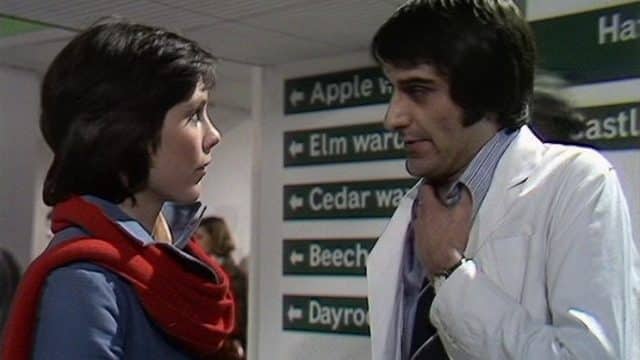
Sam: So, the brains behind this 13-part serial was Terry Nation. He’d done quite well for himself as the creative mind behind the Daleks, as well as writing for Hancock in his early years, hadn’t he? But Survivors is an altogether different beast; less Science Fiction, more Speculative Fiction? Very much in the John Wyndham or John Christopher vein.
Greg: Yes, Terry Nation. He did Blake’s 7 too. The definition of a proper good old hack – an amazing action-adventure writer. But he did his research, didn’t he? I mean, my God, how prophetic is the series? We had a conversation and you suggested it would be too much to face now, but I’m glad we dipped in. He was really onto something. That opening episode is perfect, isn’t it?
Sam: The series kicks off with The Fourth Horseman. Nation deals with the wildfire pandemic in the first episode. In fact, the title sequence alone tells you everything…
Greg: We see a Chinese scientist drop a glass vial in a laboratory. He takes a plane to the USSR, starts to feel poorly, and then there’s a montage of passports being stamped as the screen bleeds into red. It tells you everything in 45 seconds.
Sam: In one swoop, Nation blames globalism, communism and capitalism for the end of civilization; from something shady in a secretive Chinese laboratory, to an American-built 747 Jumbo Jet as the carrier between continents.
But hereon, the story is told very much from the view of London and specifically the home counties, introducing an affluent couple: Abby Grant and her husband David, who’s trying to get back home through some terrible traffic…
Greg: Meanwhile in the city, there’s young Jenny, who’s nursing her flatmate through the flu. There’s that terrible sinking realisation she has that everybody is dying. Her flatmate’s dishy doctor boyfriend (who is Asian, by the way – way ahead of its time) is giving everyone pointless ‘flu’ vaccinations. He’s ill himself, and the flatmate goes into a steep decline.
Sam: Peter Bowles is sold as the star and plays it with typical mid-70s “toxic masculinity”, and Carolyn Seymour is your standard middle class housewife. When she recovers from her fever and finds Bowles dead on the sofa, it’s a stunning reveal.
Greg: It blew my bloody socks off first time around. What a clever play on viewers’ expectations. As it’s episode one, it’s probably OK to reveal he dies. But it’s a clever reversal, isn’t it? You expect his wife Abby, who is poorly, to die. But Carolyn Seymour pulls through.
Sam: What follows, with her wandering around the village and looking for survivors, is equally shocking. She’s very much on her own, and the choice of cutting off her long and lady-like hair turns her into a warrior of sorts.
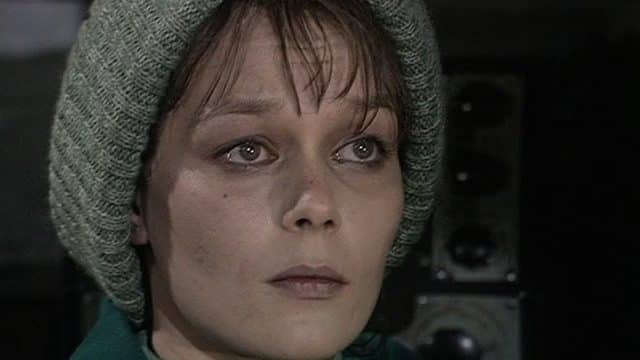
Greg: You get to see her bum as well, which some viewers will enjoy. Yes, Abby finds worshippers dead in the pews of a church, looks up to the heavens and says, “Dear God – please don’t let me be the only one.”
It is haunting, but she has a reason to live. She doesn’t know whether or not her son Peter is still alive. Like a prototype Ripley, she becomes badass. Nation realised that things would be way worse in the city, didn’t he? We’re seeing that now, sadly.
Sam: At the same time, poor Jenny attempts to escape London, which has descended into anarchy. For me, that was one of the most frightening aspects of the first episode; how the city rapidly becomes toxic and descends into barbarism. It starts with traffic delays, school closures and power cuts, and the government sends people back to their homes.
So, we’re introduced to affluent Abby Grant, student Jenny Richards and then there’s Tom Price, played by the late, great Talfryn Thomas. He’s a hobo of sorts.
Greg: A kind of cosmic hobo. No! He’s the comic relief, isn’t he. At least, that’s how he’s introduced.
Sam: Now Talfryn had been in everything. He was your go-to Welshman in the day. Same dentist as Ken Dodd.
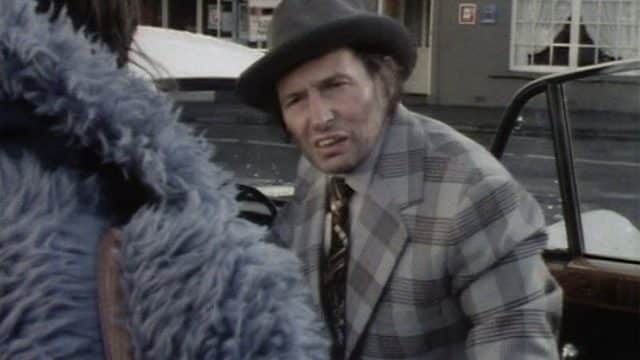
Greg: I think Talf also doubled for Freddie Mercury in mouth close-ups in some Queen music videos. There’s more I want to say on “Talf the Teeth” as he was known in the industry – because I think his performance is remarkable. This was Nation telling us that the plague would not discriminate and keep only good, hard-working, handsome people.
It would also spare feckless, bone-idle, selfish, immoral loners, and every personality type in between! Because this isn’t really a series about plague, at least after the first episode. It’s about survival, which is a totally different subject.
Sam: Absolutely, but have you noticed the undesirables are the only ones with regional accents? All the good folk speak with tremendous Received Pronunciation, especially Jenny, who is frightfully frightfully posh, darling…
Greg: Jenny is played by the lovely Lucy Fleming. Did you know she was the daughter of Celia Johnson and the niece of Ian Fleming?
So, does the regional accents thing bother you? Actors were trained to speak with RP at the time. Tom Baker and Lis Sladen [Doctor Who] were both from Liverpool. I push back against this revisionist stuff by politically correct types. Ian McCulloch is Glaswegian. Denis Lill, who comes into it later, plays it Welsh. The first “villain” we meet is Northerner George Baker. But he’s posh – he’s even wearing tweed!
Sam: I don’t have any problem with the RP, it’s just how things were in the day, and it’s refreshing to be able to understand what the cast are saying for a change. Great diction. But regional accents are only spoken by the nasty characters in Survivors. There’s no shortage of bullyboy Yorkshiremen either, but that’s later…
Greg: Sorry, just don’t buy the Guardian view of the world. (Not sorry). I think this view came in when they did the later remake [in 2008]. You think Abby would be allowed to be strong, and a leader, from a middle class background now? We’re more obsessed with class than ever in England, I’m sad to say.
Sam: The pilot episode ends with middle class Abby burning down her middle class home, and then we’re on the road into the muddy countryside where we finally get to meet middle class Greg Preston, played by closet Glaswegian Ian McCulloch…
Greg: My namesake. But he’s more handsome. Though I looked younger in my mid-30s.
Did you notice in his first scene he gloats over his wife’s corpse? “I thought you’d be the type to live just to spite me.” Not the best first impression! Gets worse for him, that episode…
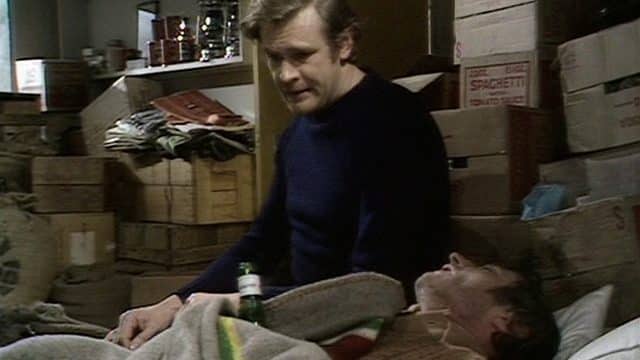
Sam: He’s a brilliant snarling alpha type – same quality as Simon McCorkindale. Not a happy man by any stretch of the imagination, and as you say he gets grumpier as the episode goes on.
He arrives in his own helicopter and comes across a spoilt brat called Anne, played by the stunning Myra Frances in an outrageous fur coat. She’s jack-knifed a tractor over her unlikely lover in a quarry. Suddenly she’s the carer and looks for a stronger male replacement. Visceral stuff, isn’t it? But Greg doesn’t want to tie himself into the situation.
Greg: He’s also quite happy to take the word of Anne – clearly a nasty woman – that the badly wounded man, Vic Thatcher, has later died. He could easily go and check, but he doesn’t.
So, we have a male lead who doesn’t want to be tied down to anyone or anything. He is, at first, a lone wolf. Vic Thatcher is a great supporting character, played initially by Terry Scully, who gives the part great sensitivity. His fate in the second episode is the ending – and boy, is it memorable. A fate worse than death…
Sam: The tone is almost relentlessly bleak in those first two episodes. It’s as if Nation is punishing, or at least schooling, his comfy middle class audience.
Sure, the disaster is bad; but the aftermath seems even worse. But we do get a brief taste of normal life again don’t we, with the introduction of Arthur Wormley, played by the great George Baker. He’s clinging on to civilized society in his newly appropriated mansion – with hot water, roast dinner, nice clothes – all protected by his bullyboys with shotguns. He calls his collective a union, doesn’t he?
Greg: Yes, he wants to form a new government. But don’t let the Tweed jacket fool you – he’s more of an Arthur Scargill militant type with Ceausescu tendencies than anything else.
In the third episode, they go to the supermarket to stockpile, don’t they? Ring any bells with you?
Sam: It’s a stark and striking reminder of how reliant we are on processed foods. There should be an abundance of everything, yet the supermarket has been seized by Wormley’s thugs.
I think this is Survivors as its most bleak, where they’re literally living hand-to-mouth from the back of a Volvo estate. Scavenging to survive.
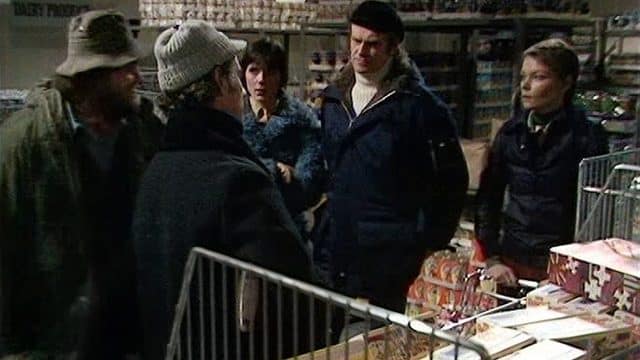
Greg: Quite. There’s a corpse hanging in the supermarket with a sign around his neck: “looter”. The gang is held at gunpoint.
Now, I have to say, I haven’t yet run into trouble with Robert Gillespie and Brian Peck at my local Asda, but it’s easy to see how, if law and order breaks down, this sort of scenario becomes inevitable. We are seeing fights in supermarkets over scarce resources. It’s all uncomfortably close to home.
Sam: Somebody recently said, “I’m one supermarket away from starving to death,” and Survivors makes that point quite clearly: we’re totally dependent on supply chains working like clockwork to survive. We’re so nannied.
After the evaporation of modern society, Survivors plays out like a gun-toting Western. Nation quickly demonstrates how people turn against each other when it’s every man for themselves.
Greg: Yes, this breakdown of society is inevitable under such circumstances. Who do you turn to when there’s no police service, no judiciary? How do you get help for illness or accidents without medical professionals? How is knowledge passed on to children with no teachers, schools or universities? The consequences are profound.
Sam: But Abby has that unique motivation beyond just survival or clinging to comforts, doesn’t she? Something which propels her through the whole series: a quest to find her son, Peter, who was boarding at a school nearby?
Greg: Abby’s search for her son ultimately becomes problematic, because it drives too many standalone episodes, and I think the writers realised it was getting tired. But episode four introduces a character we would meet again later…
Sam: Ah yes, Charles Vaughan, played by that great character actor, Denis Lill. He’ll become a major element in the second season, but for now he’s introduced as, well, something of a pagan nutter obsessed with fertilizing every woman he sees.
Charles has set up a little commune on a farm, and seemingly bred with all of the women, but they’ve come down with food poisoning. It’s another cheery episode where a whole community die out from something which would have been fairly innocuous a month or two before.
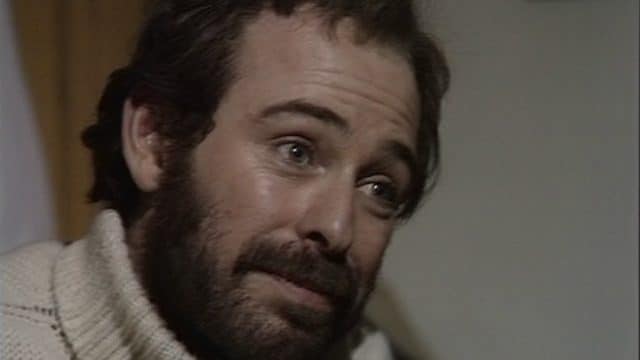
Greg: Don’t eat the fish! Yes, it’s odd how Charles Vaughan is reinvented from series two onwards, because he’s as much of a lech as Tom Price [Talfryn Thomas’s character] in Corn Dolly. How many women has he inseminated? It’s the first of two consecutive episodes where seemingly healthy people die, and I think that’s why, in my mind’s eye, I often conflate the two.
Sam: No sooner do Greg, Jenny and Abby arrive at Charles’ hippy love-in commune, and they’re on the road again and meet Tom Price, who by this point has liberated a Rolls Royce from a car showroom and is dressed like JR Ewing. It’s more hilarious comedy relief as you say, but a nice comment on how somebody like Price is having a better life in the post-apocalypse. At least, for now.
Greg: Which episode opens following Talfryn Thomas around a farm as he eats raw eggs? [Episode 3: Gone Away] There’s a fabulous bit of business where he finds a light for a cigarette, inhales, coughs his guts up, and says, “Lovely!” It cracks me up every time. That’s what Talf brought to the series.
Sam: But shunting comedy aside, the next wave of death comes in the following episode, Gone to The Angels, where a group of self-isolated religious types are infected by Abby during a passing visit.
Greg: It’s terribly sad, isn’t it? Their faith doesn’t waver, even though they have been through the sickness. They had escaped it through social isolation – something we’re all talking about now. But then they come into contact with people who have recovered from the sickness, only for them to pass it on. They don’t obey the two-metre rule.
One of the holy men is played by Nickolas Grace who was anything but holy as Anthony Blanche in Brideshead Revisited a few years later.
Sam: I particularly like how Abby has no faith, but reads from the bible to the perishing men in their final hours.
Greg: Gone to the Angels isn’t Terry Nation, is it? [Script by Jack Ronder] But I still don’t think there’s a noticeable dip in quality. When I watched it back this time, in fact, it was Terry Nation’s Garland’s War that was the first lull I felt. It’s because the episode is a nice little runaround, but it’s not as weighty, thematically, as the others. There are no moral dilemmas, it’s just a straight action adventure. You could take it out of the season without losing anything.
Sam: Garland’s War is smack in the middle of the series, and whilst it doesn’t do much to further Abby’s plight to find her son, nor explore the challenges of survival, it does fix our characters’ resolve to find somewhere to settle at the end of the episode. It’s as if the aftershocks are finally over, and they’re determined to become settlers in a brave new world.
Greg: Yes, I’d agree. And it does have Peter Jeffrey as a baddie, who is always great value.
Sam: Peter Jeffrey is always a delight. In fact, up to now the show has had a galaxy of notable stars in each episode. It’s clear the BBC spent some money on it, and Pennant Roberts’ direction is incredibly ambitious for the day: lots of crane shots and cinematic angles all on location film.
Sure, it’s technically clunky in parts compared to the production standards of today, but the writing and performances carry it through. Six episodes in, and I’m hooked again. Can’t wait to see what happens to our survivors next…
Greg: Over and over again the characters have to face up to what life and survival means, and what it is worth, and some of the answers are terrifying. Because you have to kill to protect what you have, and have no qualms about it.
Like in wartime, our fundamental concepts of what is and is not moral shifts to fit new circumstances. The worst thing to realise is that that reality is normal. We live in uncommon times of peace and plenty. Human history is far more taken up with war, starvation, pestilence, and early mortality than it is with those things we take for granted…
Continue to the review of episodes 7 to 13.
Join the journey and watch Survivors Series 1 – 3, available now on DVD from BBC Worldwide.


